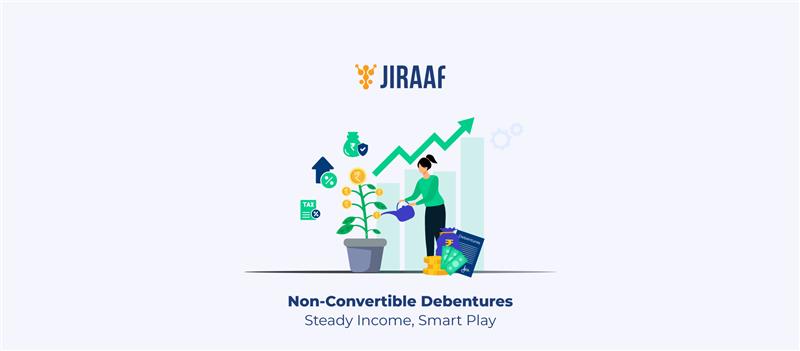Investing is like buying a new car. There’s always a benefit trade-off between choosing stability and liquidity, just like choosing between a car’s speed and mileage.
Fixed deposits (FDs) and bonds offer you stability but lock up your money. Stocks on the other hand provide liquidity but bring in volatility. Convertible debentures? They can change into equities, exposing you to market risks you may not have signed up for. It seems as if there’s always a cost to pay for one benefit with another.
So, what should you do? Are there any options that save you from choosing between the benefits by striking a perfect balance between stability and liquidity?
That’s where NCDs come into the picture. They don’t convert, they don’t dilute, and they don’t surprise you.
They appeal to investors’ interest with better interest rates than FDs or bonds, customizable payout options, and credit-rated security.
But what exactly are these NCDs? How do they work? And should you invest in them? Let’s find out.
What are Non-Convertible Debentures (NCDs)?
Non-Convertible Debentures (NCDs) are debt instruments that companies issue to raise long-term capital for their operations and growth plans. These fixed-income investments provide a set interest rate and maturity date and are not convertible into equity or shares.
Think of it like renting your money to a company, which then pays out interest to you periodically in return for that money.
How do NCDs compare to Convertible Debentures
If NCDs exist, so do CDs, or convertible debentures.
Let’s look at how the convertible debentures compare to non-convertible, which we have discussed below.
| Parameter | Convertible Debentures | Non-Convertible Debentures |
| Convertibility | Can be converted into equity shares | Cannot be converted into equity shares |
| Interest Rate | Lower due to conversion benefits | Higher to compensate for the lack of conversion |
| Risk | Lower risk as they offer equity conversion | Higher risk as returns depends solely on repayment |
| Maturity Value | Depends on the stock price | Fixed maturity value |
By design, NCDs focus on fixed-income returns purely, making them ideal for you if you prioritize stability over equity-linked growth.
Types of NCDs
NCDs can be further classified on the basis of their convertibility, tenure, interest structure, etc. But based on security, we classify them into the following two types.
Secured NCDs
These are backed by tangible company assets like property or machinery. This means that if the issuer defaults, the assets pledged as security can be liquidated to repay investors. These NCDs have a lower risk and slightly lower interest rate as compared to the unsecured ones.
Unsecured NCDs
Not backed by any assets, the repayment for these NCDs depends on the issuer’s financial health. In case of default, investors have no assets that can be liquidated to repay them. These carry a higher risk, so they offer higher interest rates to investors.
How Do Non-Convertible Debentures Work?
Like other debt instruments, NCDs are fixed-income investments that companies issue to raise capital. Investors like you lend money to these companies by buying debentures and receiving regular interest payments, and principal repayment at a predetermined time.
The Issuance Process
Companies issue NCDs through public offerings or private placements. Investors subscribe to them during the issuance period, after which these instruments may be listed on stock exchanges for secondary market trading.
Interest Rates and Payout Frequency
NCDs offer investors fixed interest rates, typically higher than fixed deposits or savings accounts. Their payout frequencies can vary from monthly, quarterly, to semi-annually and annually, depending on the terms of issuance.
For example, an NCD with a 10% annual coupon rate and a 5-year tenure will pay ₹10 per ₹100 invested annually until maturity (for 5 years).
Taxes on Non-Convertible Debentures
Taxation plays a crucial role in determining your net returns from NCD investments. Let’s understand how these instruments are taxed further.
The income earned from interest is taxed as per your income tax slab rate, since it is treated as “income from other sources”.
As for the capital gains tax, if you sell the units before 36 months, you will have to pay short-term capital gains (STCG) at the slab rates. If you sell your NCD after holding it for more than 36 months, the gains you make are considered Long-Term Capital Gains (LTCG). The tax rate for LTCG on NCDs is 10%.
For example, imagine you bought an NCD for ₹100 and sold it after 40 months for ₹130. Your capital gain is ₹130 (selling price) – ₹100 (purchase price) = ₹30. You will then pay 10% of ₹30 as Long-Term Capital Gains Tax, which is ₹3.
So, if you sell your NCD after holding it for more than 36 months, you will be taxed at a flat rate of 10% on the capital gain. The indexation benefit is no longer available.
Advantages of Non-Convertible Debentures
Investing in NCDs offers several compelling benefits for investors like you:
- Higher Returns: NCDs generally provide better interest rates than savings instruments like traditional fixed deposits.
- Portfolio Diversification: They add a fixed-income component to your portfolio, balancing equity-linked volatility.
- Liquidity: Most NCDs are listed on stock exchanges, allowing you to sell them before maturity.
- Transparency: NCDs are assigned credit ratings by agencies like CRISIL or ICRA, which help assess issuer credibility transparently.
- No TDS Deduction: Interest earned on dematerialized NCDs does not attract Tax Deducted at Source (TDS).
Risk Factors Associated with NCDs
While NCDs are relatively safer than equities, they are not without their set of risks:
- Liquidity Risk: Although tradable, some NCDs may face low demand in secondary markets, making it difficult for you to sell them quickly.
- Credit Rating and Default Risk: The issuer’s creditworthiness is paramount with NCDs. A downgrade in ratings or the company’s financial distress could lead to default on interest or principal payments.
- Market Risk: Changes in interest rates can impact the market value of NCDs. For instance, when interest rates decline, newly issued NCDs offer lower returns, making existing NCDs with higher fixed rates more attractive, increasing their market value. And when interest rates rise, new NCDs come with higher yields, making older NCDs with lower returns less appealing, which can drive down their resale value.
How Do NCDs Compare with Similar Investment Options?
Before locking your funds in NCDs, you should understand how they stack up against other fixed-income instruments like FDs and corporate bonds.
Here’s a quick comparison to help you make a more informed decision:
| Features | NCDs | FDs | Corporate Bonds |
| Issuer | Private/public companies | Banks or NBFCs | Corporates or government-backed entities |
| Return Type | Fixed interest | Fixed interest | Fixed or floating rate interest |
| Interest Rate | Higher than FDs, depending on the credit rating | Lower but stable | Varies by issuer, generally between NCDs and FDs |
| Liquidity | Moderate (if listed) | Low (penalty on premature withdrawal) | Moderate to high (if listed) |
| Risk Level | Moderate to High (issuer-dependent) | Low (especially with government banks) | Moderate (depends on credit rating and structure) |
| Security | Can be secured or unsecured | Usually unsecured but institution-backed | Usually secured or with protective covenants |
| Tradability | Yes, if listed on exchanges | No | Yes, if listed |
| TDS Deduction | No TDS on demat NCDs | TDS applicable if interest exceeds ₹40,000 (₹50,000 for seniors) | No TDS on listed bonds held in demat form |
| Tax Treatment | Interest taxable as per slab; LTCG @10% (after 36 months) | Interest taxable as per slab | Similar to NCDs |
Who can Invest in Non-Convertible Debentures?
Investors across categories—retail, institutional, and high-net-worth individuals—can invest in NCDs, provided they meet the issuer’s eligibility and minimum investment requirements.
Here’s how it works for each type of investor:
- Retail Investors: NCDs offer retail investors the opportunity to generate steady income through fixed interest payments. For those seeking stable returns with a manageable level of risk, this investment can diversify their portfolios beyond savings options like traditional fixed deposits.
- High Net-Worth Individuals (HNIs): NCDs provide HNIs with a secure investment option that complements their broader portfolio. With access to a variety of NCDs with varying levels of risk and return, HNIs can fine-tune their fixed-income allocation while enjoying attractive yields.
- Institutional Investors: Banks, mutual funds, and other financial institutions invest in high-rated NCDs to enhance their fixed-income holdings. These institutions benefit from the predictable returns and the opportunity to invest large sums in relatively low-risk instruments, making NCDs an attractive option for balancing their portfolios.
Should You Invest in Non-Convertible Debentures?
Whether or not you should invest in NCDs depends on your financial goals and risk appetite.
Here’s how you can determine whether you should invest in them, based on your investor profile:
- Risk-averse Investors: Secured NCDs are a good fit for those seeking stability over high returns. They are backed by company assets and offer predictable returns. Choosing AAA-rated secured NCDs can further minimize the risk.
- Income-seeking Investors: NCDs are ideal for investors who need regular interest payouts. Retirees or those seeking steady passive income can rely on NCDs for consistent cash flow.
- Diversification-seeking Investors: NCDs can balance equity-heavy portfolios, providing fixed income that reduces your overall portfolio volatility and risk.
Some important considerations you should keep in mind before choosing NCDs are:
- Issuer’s Financial Health: Always check the credit rating and financial stability of the issuer. Higher-rated NCDs are generally safer but consider the default risk with lower-rated issuers.
- Liquidity: Some NCDs might not have an active secondary market, so assess your liquidity needs before investing.
- Interest Rates: Rising interest rates can impact the resale value of existing NCDs. Keep track of the interest rate environment regularly and make decisions accordingly.
For conservative investors, AAA-rated secured NCDs are the safest option. If you’re looking for higher yields, unsecured NCDs with strong financial backing might offer better returns but come with higher risk.
How to Invest in Non-Convertible Debentures?
If you want to invest in NCDs, follow the below-listed steps:
- Evaluate credit ratings and financial health of companies offering NCDs.
- Choose an Issuance Mode. Under a public issue, you can subscribe to these instruments during issuance, through brokers or online platforms. You can also purchase listed NCDs via stock exchanges in the secondary market.
- Complete all your KYC Formalities. Ensure your Demat account is active for convenient transactions.
- Track interest payouts and market performance of the deals you like.
- Choose the units and deal of your choice and make the payment.
Conclusion
NCDs are an effective tool for any investor seeking consistent income and portfolio diversification. Their fixed interest payouts and relatively predictable nature make them particularly attractive in uncertain market conditions.
But, like all investments, NCDs carry specific risks, including credit risk, interest rate sensitivity, and liquidity concerns, which should be carefully evaluated before you commit to investing in them.
For investors willing to balance risk with reward, NCDs can provide a way to earn higher returns than traditional fixed-income options. But choosing the right type, whether secured or unsecured, is one of the main factors here.
In a well-rounded investment strategy, NCDs can play a pivotal role in achieving stable returns, but their suitability will ultimately depend on your risk profile and long-term financial objectives. So, make sure you invest in them only if they align with your strategy.
Discover fixed income investments with Jiraaf, a SEBI registered online bonds platform that educates and brings access to a wide array of bonds. Sign up today to explore diversified fixed income investment opportunities to support your goal-based wealth creation journey. Start investing!



